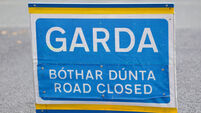Garda body cams should not use facial recognition technology, committee warns

The committee recommends strict guidelines on when gardaí activate and deactivate camweras.
Garda body-worn cameras should not use facial recognition technology and should not be used to racially profile people, according to recommendations from the Oireachtas justice committee.
Provision for the use of body-worn cameras (BWCs) is set out in draft legislation, published last July.











